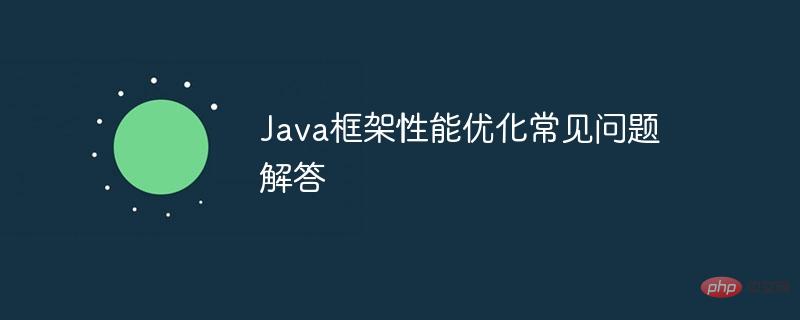Home >Java >javaTutorial >Java Framework Performance Optimization FAQs
Java Framework Performance Optimization FAQs
- PHPzOriginal
- 2024-06-04 22:39:00540browse

Java Framework Performance Optimization FAQ
Introduction
In high concurrency and data throughput In high-volume systems, performance optimization of the Java framework is crucial. This article explores some common performance optimization problems and their corresponding solutions.
1. Database connection management
Problem: The application creates too many database connections, causing resource exhaustion.
Solution: Use a connection pool to manage database connections. It can reuse connections and avoid frequent creation and destruction of connections.
import java.sql.DriverManager;
import javax.sql.DataSource;
import com.jolbox.bonecp.BoneCPDataSource;
public class DatabaseConnectionPool {
private static DataSource dataSource;
public static DataSource getDataSource() {
if (dataSource == null) {
BoneCPDataSource cpds = new BoneCPDataSource();
cpds.setJdbcUrl("jdbc:mysql://localhost:3306/mydatabase");
cpds.setUser("root");
cpds.setPassword("password");
cpds.setMinConnectionsPerPartition(5);
cpds.setMaxConnectionsPerPartition(20);
dataSource = cpds;
}
return dataSource;
}
}2. Object cache
Problem: The application frequently creates objects, causing performance overhead.
Solution: Use caching technology to store frequently used objects to avoid repeated creation.
import java.util.HashMap;
import java.util.Map;
public class ObjectCache {
private static Map<String, Object> cache = new HashMap<>();
public static Object get(String key) {
return cache.get(key);
}
public static void put(String key, Object value) {
cache.put(key, value);
}
}3. Lazy loading
Problem:The application loads all data at once, occupying a lot of memory.
Solution: Use lazy loading technology to load data only when needed.
import org.hibernate.annotations.LazyCollection;
import org.hibernate.annotations.LazyCollectionType;
@Entity
public class Order {
@Id
@GeneratedValue
private Long id;
@LazyCollection(LazyCollectionType.EXTRA)
private List<OrderItem> items;
}4. Lazy loading of collections using Select In
Problem: When using Hibernate to lazily load collections, it causes N+1 query problems.
Solution: Use Hibernate's @BatchSize annotation to specify the maximum number of collection elements that can be loaded in one query, or optimize through the select in statement Inquire.
@Entity
public class Order {
@Id
@GeneratedValue
private Long id;
@BatchSize(size = 10)
private List<OrderItem> items;
}5. Redis as a cache
Problem:Using memory cache (such as Ehcache) as a cache results in data loss or inconsistency.
Solution: Use Redis as a persistent cache, which can avoid data loss and improve availability.
import redis.clients.jedis.Jedis;
public class RedisCache {
private static Jedis jedis;
public static void set(String key, String value) {
jedis.set(key, value);
}
public static String get(String key) {
return jedis.get(key);
}
}Practical case
Question: Highly concurrent transaction system for e-commerce websites.
Optimization measures:
- Use connection pool to manage database connections.
- Use Caffeine as a caching tool to cache popular product information.
- Use Redis as a persistent distributed cache to store shopping cart information and order information.
Through the above optimization measures, the concurrency performance and response time of the trading system have been significantly improved.
The above is the detailed content of Java Framework Performance Optimization FAQs. For more information, please follow other related articles on the PHP Chinese website!
Related articles
See more- How to Inject Dependencies into Self-Instantiated Objects in Spring?
- How to Dynamically Add Files to the Java Classpath at Runtime?
- How to Calculate the Difference Between Two Dates in Days Using Android/Java?
- Why i created a lightweight mini spring alternative and how I did it
- Applying JSON Patch to Entity in a Spring Boot Application: A Practical Guide

